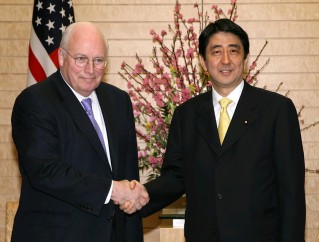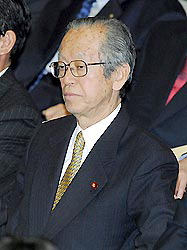Koizumi is the flagship advisor to a newly-established think tank. The XX, which will be chaired by economist Naoki Tanaka, who was close to the Koizumi administration. Here’s one of the initial reports from soon after Koizumi left office:
Sunday, October 8, 2006
Major Japan Firms To Set Up Think Tank, Invite Koizumi As Adviser
LONDON (Nikkei)–Toyota Motor Corp. (7203) and other leading Japanese companies plan to establish a think tank possibly by the end of this year and invite former Prime Minister Junichiro Koizumi to become one of its advisers, The Nihon Keizai Shimbun has learned.
The firms aim to use the research organization to heighten the ability of the private sector to make policy proposals to the government as well as make their opinions known overseas.
The new entity will be modeled on the Brookings Institution and other U.S. research and policy bodies that participate in policy formation in Washington. It will conduct in-depth studies on international matters ranging from natural resources, currency and energy to diplomacy, security and the environment.
Promoters of the plan, including Toyota, Canon Inc. (7751) and Nippon Steel Corp. (5401), whose top executives have headed the Japan Business Federation, Japan’s top business lobby, have already begun soliciting other large firms to help fund the project.
The think tank will be headed by Naoki Tanaka, a noted economic analyst, according to the plan, which the group hopes to make public possibly early next week.
During the Koizumi years, the LDP had tinkered with the idea of forming its own think tank to build intra-party policymaking capabilities vis-a-vis the bureaucracy, but it never ended up happening. A well-known private, conservative think tank that makes its presence felt could achieve the same purpose. There are lots of think tanks in Japan now, but many are either tied to universities, major corporations, and specific commentators and lack the same prestige, power, personnel, and policy clout of the US model.
Except it seems like the only major outlet reporting on last night’s kickoff ceremony is the sensationalist Gendai:
Former PM Koizumi Raises 2 billion yen
Since leaving office, Koizumi has stayed out of the public eye, save for Diet appearances. Last night (Mar 12) he showed up at the kickoff ceremony for a private think tank, an event that was attended by business and industry heavies. What was most surprising was his ability to raise cash. The 4 founding companies have invested 100 million yen, and the 80 member companies have contributed 20 million yen apiece for a total of 2 billion yen. Naoki Tanaka, a commentator cose to the ex-PM, will serve as chairman. The chairman’s salary is 50 million yen annually, and Koizumi himself, who will serve as an advisor, will reportedly receive substantial advisor’s fees. Despite this, the think tank is designated as a “voluntary organization” and not a foundation or political organization. What’s going on here?
Americans might be somewhat used to the idea of former political leaders finding second careers as lobbyists after they leave office, but the Japanese press can always score some cheap points by accusing someone of making too much money.
But as much as I want to defend Koizumi, I have to wonder why this venture is launching with so little fanfare or detail. It doesn’t even seem to have a website yet. Is it truly going for a Brookings-style approach, or will this end up as Koizumi’s shadow war room to try and influence the government from behind the scenes (like former PM Nakasone’s organization)? I don’t think I’m alone in echoing Gendai’s sentiments — どうなってんのか?


 4. Finance Minister Koji Omi got slammed by Sumio Mabuchi (DPJ) over a slightly scandalous situation: Omi’s daughter accompanied the minister at meetings that he attended as an observer to establish his pet project, the
4. Finance Minister Koji Omi got slammed by Sumio Mabuchi (DPJ) over a slightly scandalous situation: Omi’s daughter accompanied the minister at meetings that he attended as an observer to establish his pet project, the